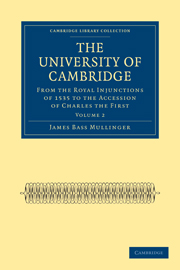Book contents
- Frontmatter
- PREFACE
- Contents
- ABBREVIATIONS, ETC.
- INTRODUCTION
- CHAP. I COMMENCEMENT OF THE UNIVERSITY ERA
- CHAP. II RISE OF THE ENGLISH UNIVERSITIES
- CHAP. III CAMBRIDGE PRIOR TO THE CLASSICAL ERA
- CHAP. IV STUDENT LIFE IN THE MIDDLE AGES
- CHAP. V CAMBRIDGE AT THE REVIVAL OF CLASSICAL LEARNING
- CHAP. VI CAMBRIDGE AT THE REFORMATION
- APPENDIX
- INDEX
CHAP. IV - STUDENT LIFE IN THE MIDDLE AGES
Published online by Cambridge University Press: 07 September 2010
- Frontmatter
- PREFACE
- Contents
- ABBREVIATIONS, ETC.
- INTRODUCTION
- CHAP. I COMMENCEMENT OF THE UNIVERSITY ERA
- CHAP. II RISE OF THE ENGLISH UNIVERSITIES
- CHAP. III CAMBRIDGE PRIOR TO THE CLASSICAL ERA
- CHAP. IV STUDENT LIFE IN THE MIDDLE AGES
- CHAP. V CAMBRIDGE AT THE REVIVAL OF CLASSICAL LEARNING
- CHAP. VI CAMBRIDGE AT THE REFORMATION
- APPENDIX
- INDEX
Summary
Changes which sever modern and mediæval times
Our researches into our university history during the Middle Ages are now approaching their completion. We have arrived at the boundary line which, by general consent, has been drawn between the old and the new order of things,—the time when the traditions of the past began to give place to those widely differing conceptions which the fifteenth century ere it closed saw rising upon Europe. Momentous and startling as have been the changes of the present century, it may yet be questioned whether they do not yield in importance to those that ushered in the Reformation. The downfall of dynasties, the manifest shifting of the centres of political power, even the triumphs of modern science and art, can scarcely compare with influences like those that readjusted the whole range of man's intellectual vision, and transformed his conception of the universe. It was then that the veil was lifted from the face of classic Greece, and the voices which had slumbered for centuries woke again; that the accents of ancient Hellas blended with those of regenerated Italy; while Teutonic invention lent its aid in diffusing with unprecedented rapidity both the newly discovered and the nascent literature.
‘Another nature and a new mankind’
stood revealed beyond the Atlantic wave. The habitable globe itself dwindled to but a point in the immensity of space; and the lamps of heaven now glimmered with a strange and awful light from the far recesses of infinity.
- Type
- Chapter
- Information
- The University of Cambridge , pp. 328 - 378Publisher: Cambridge University PressPrint publication year: 2009First published in: 1884



